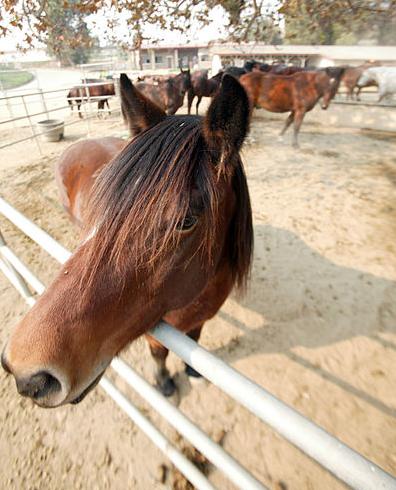NORTH FORK – When wildfire threatens, those who own large animals are faced with decisions that go beyond what they will do to protect their family and their home. Evacuating horses presents a completely unique set of problems.
Equine Emergency Evacuation (Triple E) is an all volunteer organization of mountain area residents who have come together to provide emergency evacuation for large animals (horses, mules, etc.) in the event of natural disasters such as fires, rock slides, and flooding.
With fire season upon us, Triple E will be holding this year’s first evacuation refresher training on Saturday June 22, at 9 a.m. The training will be held in North Fork at Mike and Lynn Vaughn’s ranch, 34204 Road 223. There will be snacks and finger food to follow.
This is a good chance for members to get trained and to meet fellow volunteers. But it is also an excellent opportunity for non-members to come and learn about Triple E and what being a member means.
Anyone who is interested in large animal evacuation is welcome to come and participate. There will be a new member orientation, including information on the positions members can select to fill, and the responsibilities of those positions. Interested persons can get additional information by calling Mike and Lynn Vaughn at 877-8699 or Steve Hall at 877-6200.
The following information is from the Triple E Quarterly Newsletter June 2013, written by Mike Vaughan, and is shared for the benefit of all readers:
We have been talking to Cal Fire, and it’s a dangerously dry season this year. We have monitored several fires already and it’s going to get worse! There are several things you need to do to get yourselves ready.
You must make sure that you are OK before you can worry about helping others. You can help yourselves by taking care of the following:
-Make sure you have completed your brushing and have a safe zone around your property (100′ clearance).
-Make sure your trailer and vehicles are in good shape and ready to go.
-Have halters and lead ropes available for all your animals.
-Have your GO BAGS ready with at least two weeks of any meds that you take and the same for your critters if they are on meds.
-Your go bags should contain several days change of clothing, water and emergency rations for you and your pets.
-Make sure that you take care of your closest neighbors. Keep an eye out for them and have them do the same for you.
-Know where you will go and what routes you will take to get there. Have a contingency plan that includes several places to go in case you have to evacuate.
-If you have to go make sure you contact us and let us know you are evacuated and in the clear. Let us know where you are and if you need any further assistance.
-Let us know when you are on vacation so we can evacuate for you if need be.
-Make sure your pet sitters or house sitter knows what to do and who to contact.
These are just a few things to think about before things get crazy. It is extremely important that you take care of yourselves first.
Lynn and I have trained all winter with the Central California Animal Disaster Team (CCADT), for the Region Five area of Central California. We are working to develop a Large Animal Component. This will give us the ability to draw from five counties in a mutual aid situation. This also means that we need to be on a standardized program and train together.
We have tested and tested our organization and believe that we have a system that will work. We added a new dimension to the system when we developed the Strike Team concept. The strike team responds to the fire zone and makes liaison with the fire crews.
The strike team determines which residence will evacuate first and assesses the location for the best approach to the evacuation prior to the evacuation team’s arrival. They will also monitor the fire to insure that the ERT teams are entering a safe zone. ERT teams will respond and evacuate while the Strike Team assess the next location.
There were no changes to Animal ID, Vet Assistance, Animal Care and Data Systems. As we grow we may need to add a logistics section. Our system has functioned well in training but we will have to wait and see how it plays out under real circumstances. It is my firm belief that it is just a matter of time before we get tested in a real life situation.
It is important that all of our volunteers get trained and placed into a section so that they know what they will be doing. If you have yet to be trained, try to attend a session and get the word out that we need new volunteers. We train for the disaster so we must plan the work and work the plan.
Respectfully,
Michael Vaughn, President



